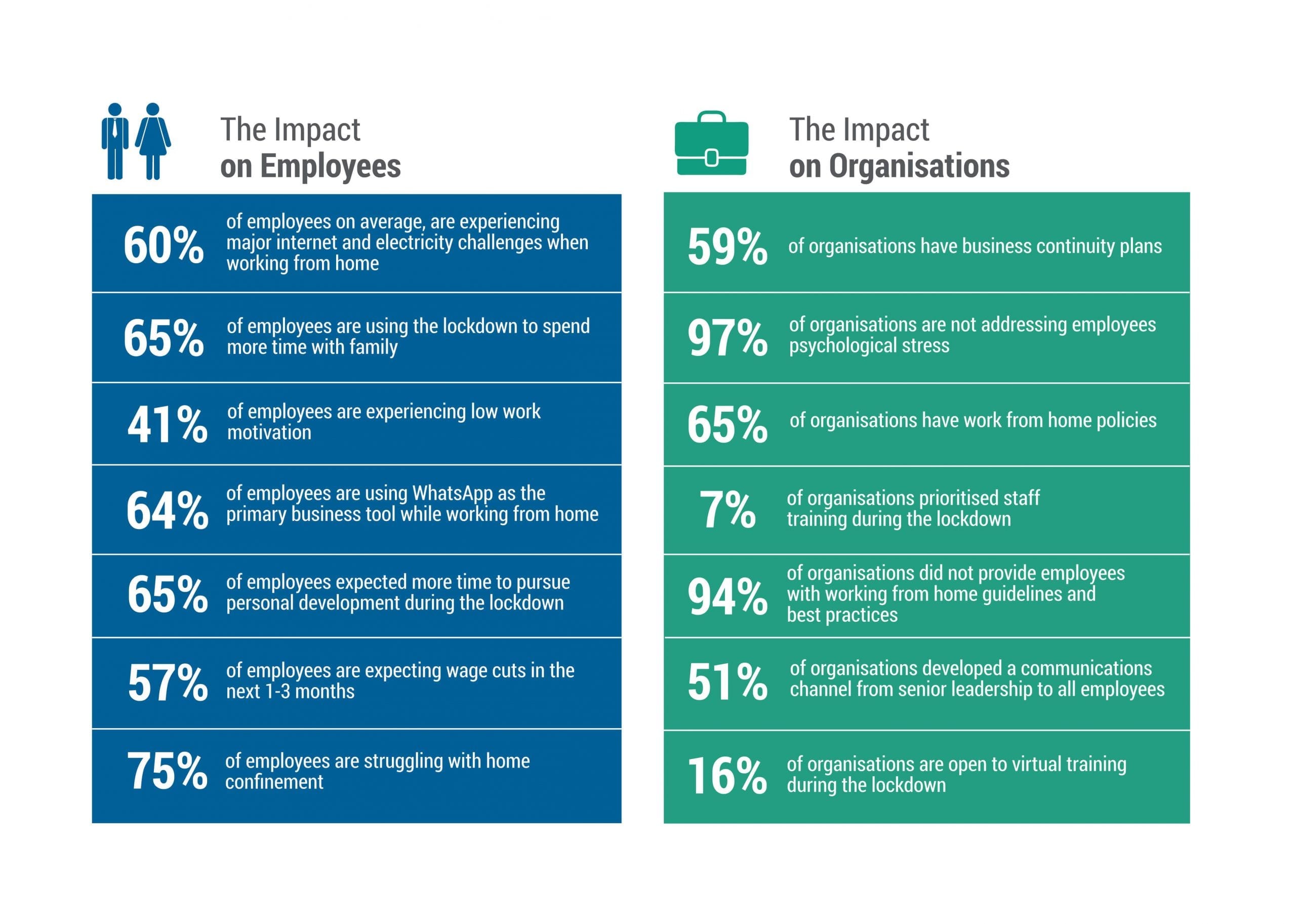Our data suggests that many organisations are focused on cutting costs. But in a pandemic, employee well-being and a motivated workforce is the key to a speedy recovery.
97% of organisations are not addressing employees’ psychological stress. As global supply chains are disrupted, the International Monetary Fund (IMF) has predicted the worst Nigerian recession in 30 years. Studies suggest, that areas most topical for Nigerian businesses are liquidity and lay-offs. Board rooms up and down the country are desperately trying to figure out how long the recovery will take and the impact on their cash flow.
However, a recent pcl. study indicates that the well-being of employees must also feature highly on the executive agenda. From our experience, negative impacts on employee well-being can be protracted and long-lasting, often leading to a psychological disconnection between the employee and the organisation. With a recession looming, if this disconnection is not tackled head-on, organisations will witness low employee productivity, resulting in a slower-than-expected business recovery in a COVID-19 new normal.
Most Business Continuity Plans (BCP) appeared to place a premium on the provision of hard infrastructure to guarantee business operations. Therefore even though 65% of organisations in Nigeria implemented work from home policies during the lockdown, 94% of employees were not provided with Working From Home (WFH) guidelines and best practices. Nevertheless, WFH was a welcome development, as 65% of employees in Nigeria aimed to use the lockdown as an opportunity to enjoy time with family and pursue personal development objectives.
The question is, should organisations place more emphasis on developing the softer components of the recovery, in a bid to reinforce the psychological contract between the employer and employee? Our experience suggests that such contracts are critical for developing employee well-being, a consequence of which is improved organisational performance through deeper business connectivity. For example, despite the organisational focus on hard infrastructure, 60% of employees on average are experiencing electricity and internet challenges while working remotely. Whilst higher than expected usage by employees was foreseeable, many organisations did not make financial provisions for the additional data that was consumed or provide power banks to cope with electricity fluctuations. This small but meaningful oversight was a common source of an anecdotal employee complaint.
The numbers suggest a broader challenge of organisations failing to align modern digital technologies to firm business commitments pertaining to personal development, continuous learning, cross-functional collaboration and innovation. With 65% of employees aiming to pursue personal development objectives during the lockdown, merely 7% of organisations prioritised staff training during the lockdown, and only 16% of companies were open to virtual learning. Furthermore, 64% of employees are still using WhatsApp as the primary business tool while WFH. However, along with standard cybersecurity concerns, as a tool for managing business communications and driving high performing teams, WhatsApp still has several limitations. But, do the numbers identify a failure to use technology effectively or do they harbour a more profound concern which suggests that organisations are failing to grapple with anticipated seismic shifts in the ‘future of work’? With the long-term possibility of business uncertainty and disruption in ways of working, technology aligned business objectives are critical for providing employees with the tools essential for empowerment, self-management and personal accountability.
Fig 1: The People Pandemic
pcl. insights on the perception of employees and organisations during COVID-19.
A focus on employee well-being, i.e. team engagement, personal development, social support, and work motivation, is critical at the best of times. But more so in a time of employee isolation, social distancing, homeschooling, financial strain, housing and food insecurity, job anxiety and most importantly, the potential loss of family and loved ones. Such pressures acutely align with the physiological needs identified by the psychologist Abraham Maslow in his paper “A Theory of Human Motivation”. If an employee is hungry, it will be hard to focus on anything other than food. Predictably, the brunt of the discomfort will fall on those in the medium to low-income bands. According to the National General Household Survey that was conducted in 2019; 32% of Nigerian households experienced food shortages. This might explain why 41% of employees are admitting to low work motivation, and 75% are struggling with home confinement. Consequently, even though 51% of organisations claimed to possess senior management channels for employee engagement, going forward, we must consider the frequency and commitment to using those channels for discussing issues of well-being.
There are several early warning signs for identifying disconnected employees. Key performance indicators include increased absenteeism, increased number of sick days, lateness to the office, higher staff turnover, low employee engagement, and reduced productivity. However, a considered approach to driving employee intimacy can shift corporate culture to ensure human capital remains a key lever for performance. With the uncertainty and complexity of things to come, employee well-being must be front and centre of the recovery process for Nigerian organisations. 57% of employees are expecting wage cuts in the next 1-3 months, so it would be foolhardy to infer that tough, unpopular decisions do not lie ahead. But it is also worth noting that decisions that impact employee well-being will have socio-economic outcomes that extend far beyond the organisation and into the broader realms of society (The unintended consequence of change). The ability of an organisation to remain connected with employees, strengthen the psychological contract and prioritise areas of well-being, are critical to ensuring superior performance and accelerated COVID-19 recovery. Not just for organisations, but the country as a whole.
To download the complete survey, click here.
Written by:

Rob Taiwo
Managing Director

